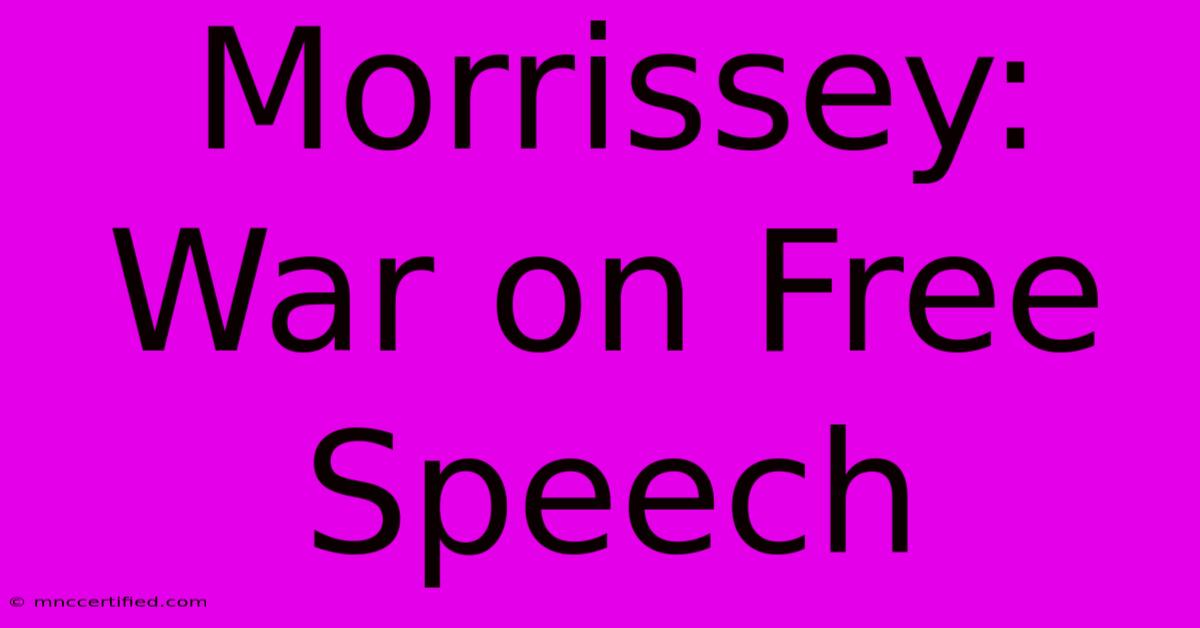Morrissey: War On Free Speech

Table of Contents
Morrissey: The Self-Proclaimed Victim of a "War on Free Speech"
Morrissey, the enigmatic former frontman of The Smiths, has long been a controversial figure. His recent pronouncements, however, have sparked a renewed and intense debate surrounding free speech, artistic expression, and the consequences of controversial opinions. This article delves into Morrissey's claims of being targeted in a "war on free speech," examining the validity of his arguments and the complexities surrounding his public image.
The Nature of Morrissey's Controversies
Morrissey's career has been punctuated by outspoken statements on various topics, often generating significant backlash. He's been accused of everything from racism and homophobia to promoting conspiracy theories. These accusations, he argues, represent a suppression of his right to free speech, a calculated attack on his artistic expression.
Specific Examples and Backlash
Let's examine some key incidents that have fueled this narrative:
-
His comments on immigration and Brexit: Morrissey's views on immigration have consistently drawn sharp criticism, with many labeling them as xenophobic. Similarly, his support for Brexit sparked considerable controversy. He maintains that expressing these opinions is simply exercising his freedom of speech, regardless of the negative responses.
-
His support of controversial figures: His public endorsements of figures with controversial pasts have further alienated many fans and critics alike. He often defends these actions as being independent and unbiased, choosing to support those who are similarly labelled as "outcasts."
-
His statements on gender identity and other social issues: Morrissey's views on gender identity and LGBTQ+ issues have been the subject of extensive criticism, leading to accusations of transphobia and homophobia. He often counters these accusations by emphasizing his right to hold and express his personal beliefs, regardless of their potential offensiveness to others.
The "War on Free Speech" Argument: Valid or Self-Serving?
Morrissey frequently frames the criticism he receives as a deliberate attempt to silence him – a "war on free speech." While the right to free speech is a fundamental principle in many democratic societies, it's crucial to distinguish between expressing unpopular opinions and inciting hatred or violence.
The Limits of Free Speech
It's important to understand that free speech is not absolute. Many countries have laws against hate speech, incitement to violence, and defamation. While Morrissey may have the right to express his opinions, he doesn't have the right to do so without facing consequences for potentially harmful or offensive statements.
The Difference Between Criticism and Censorship
The criticism Morrissey receives is often conflated with censorship. Criticism, even harsh criticism, is a vital part of a free and open society. Censorship, on the other hand, involves suppressing speech through official means. While Morrissey may experience significant backlash for his views, it's a critical difference to determine whether this backlash constitutes actual censorship or simply public disapproval.
The Impact on Morrissey's Career and Public Image
The controversies surrounding Morrissey have undoubtedly impacted his career and public image. Many venues have canceled his performances, and his music has faced boycotts. While he maintains these actions are a result of censorship, others argue that they are a natural consequence of his repeated controversial pronouncements. This dynamic highlights the complex relationship between artistic expression and social responsibility.
Conclusion: Navigating the Tightrope of Free Speech
Morrissey's case raises critical questions about the boundaries of free speech, the responsibilities of public figures, and the potential consequences of expressing controversial opinions. While the right to free speech is paramount, it's not a shield against criticism or the consequences of harmful statements. The debate surrounding Morrissey's actions serves as a potent reminder of the complexities inherent in navigating the delicate balance between freedom of expression and social responsibility. The question remains: is Morrissey a victim of a "war on free speech," or is he simply facing the consequences of his own words? The answer, like Morrissey himself, remains complex and open to interpretation.
Keywords: Morrissey, free speech, controversy, censorship, criticism, artistic expression, public figure, backlash, opinions, consequences, social responsibility, hate speech, Brexit, immigration, LGBTQ+, homophobia, transphobia.

Thank you for visiting our website wich cover about Morrissey: War On Free Speech. We hope the information provided has been useful to you. Feel free to contact us if you have any questions or need further assistance. See you next time and dont miss to bookmark.
Featured Posts
-
Burgharts Pmqs Win Attack On Labour Farm Tax
Nov 21, 2024
-
Simmons Insurance Pilot Mountain
Nov 21, 2024
-
Westbrooks Tech Rescinded After Staredown
Nov 21, 2024
-
Fortnite Juice Wrld Concert Details And Items
Nov 21, 2024
-
Laken Riley Murder All Counts Guilty
Nov 21, 2024